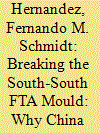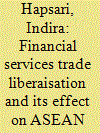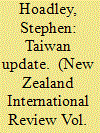|
|
|
Sort Order |
|
|
|
Items / Page
|
|
|
|
|
|
|
| Srl | Item |
| 1 |
ID:
162355


|
|
|
|
|
| Summary/Abstract |
China and New Zealand were able to sign a Free Trade Agreement (FTA) in 2008, in spite of the large differences in standards under which they were respectively negotiating trade agreements in the international arena. This article starts with a descriptive analysis of these differences between each country’s standards in terms of FTA quality. With the description of these standards, which seem to stand on opposite sides of a continuum, we examine why China and New Zealand decided to forego the standards under which they had negotiated previous agreements in order to find a middle ground. This process of convergence showcases how the interests of both parties moved them towards the adoption of a middle ground which enabled them to negotiate a win-win agreement.
|
|
|
|
|
|
|
|
|
|
|
|
|
|
|
|
| 2 |
ID:
153315


|
|
|
|
|
| Summary/Abstract |
This article examines how contestable market theory (contestability) has come to reconfigure the economic and regulatory concept of competition in order to enhance the compatibility of Australia’s economy with international trade and investment agreements. Australia has recently negotiated and signed a raft of bilateral, plurilateral and regional agreements, including the Trans-Pacific Partnership Agreement and the Australia–China Free Trade Agreement. In order to ensure that Australia meets its obligations and commitments to these agreements, two key advisory bodies—the Harper Panel on Competition Policy Review and the Financial System Inquiry—made recommendations, the majority of which were accepted by the government, to ready Australia’s competition governance and economic policy for greater global integration. Such impact is dependent on, among other things, how domestic competition policy meshes with the free market ideology underpinning such international agreements, which favours the breakdown of barriers to markets. Less well known is the role of contestability in radicalising ideology as it countenances monopolisation and privatisation in the guise of market access by justifying the substitution of actual competition with the mere threat of competition. The article concludes that the monopoly power of transnational corporations will be enhanced through the acquiescence of governments to the new governance regime of the Trans-Pacific Partnership Agreement, which, supported by domestic policy, is set to redraw competition policy in the light of contestability theory.
|
|
|
|
|
|
|
|
|
|
|
|
|
|
|
|
| 3 |
ID:
098931


|
|
|
| 4 |
ID:
128912


|
|
|
| 5 |
ID:
163746


|
|
|
|
|
| Summary/Abstract |
Intra- and inter-regional migration is widely described. Prior studies have attribute varied reasons for this development including the quest for greener pastures and unequal development in northern Ghana. What has escaped critical scrutiny is some migrants’ ability to escape extreme rural poverty, albeit in harsh urban environment. Such a missing gap can potentiate high policy failures, hence the need for academic attention. Using a mixed method, we focus on two informal daily livelihoods as exemplars – exceptionalism – in Accra. We see their embedded organisational vitality and dynamic networks as illuminating for good livelihood practices, proper city governance and fostering economic empowerment. We call on city authorities to take cognisance of such complexities and heterogeneity of production–labour relations, failure of which can spell doom for policies ostensibly initiated to curb migration, as they are likely to be underpinned by factual inaccuracies and may result in ill-fated interventions.
|
|
|
|
|
|
|
|
|
|
|
|
|
|
|
|
| 6 |
ID:
106943


|
|
|
|
|
| Publication |
2011.
|
| Summary/Abstract |
In this article, the probability of opening to trade is related to a country's propensity to learn from other countries in its region. It is argued that countries have different motivations to learn, depending upon the responsiveness and accountability of their political regimes. Whereas democracies cannot afford to be dogmatic, authoritarian regimes are less motivated to learn from the experience of others, even if they embrace policies that fail. Using data on trade liberalisation for 57 developing countries in the period 1970-1999, it is found that democracies confronting economic crises are more likely to liberalise trade as a result of learning; among democracies, presidential systems seem to learn more, whereas personalist dictatorial regimes are the most resistant to learning from the experience of others.
|
|
|
|
|
|
|
|
|
|
|
|
|
|
|
|
| 7 |
ID:
128903


|
|
|
| 8 |
ID:
182607


|
|
|
|
|
| Summary/Abstract |
India dropped out of the Regional Comprehensive Economic Partnership (RCEP)—which included the Association of Southeast Asian Nations (ASEAN) countries, China, South Korea, New Zealand, Japan and Australia—after negotiating for almost seven years in November 2018 on the grounds of national interest and also that free trade agreements (FTAs) did not amount to free trade and led to more trade diversion than trade creation. The cost and benefit of a regional agreement depend on the amount of trade creation with respect to trade diversion (Panagriya, 2000). This study tries to examine India’s concerns and, at the same time, highlights the cost of not joining RCEP. India’s trade deficit with 11 out of the 15 RCEP nations has been a major cause of concern. Unfavourable trade balance, concerns about the impact on dairy sector, economic slowdown, past experience with FTA’s, China factor, data localisation, rules of origin and the experience of ASEAN countries with Sino-FTA have been some of the reasons behind India’s decision to opt out of this mega multilateral agreement. Also, bilateral trade agreements with some RCEP countries such as Japan, Malaysia, Singapore, Thailand and South Korea were operational. A multilateral trade agreement with ASEAN countries was very much in place. So, trade between India and 12 of the RCEP member countries would not have changed much after India’s inclusion in the RCEP. The impact of lower tariffs would have been evident for the remaining three countries: China, Australia and New Zealand. Furthermore, there was fear of a massive surge in imports of manufactures from China and dairy imports from Australia and New Zealand. This study also examines the long-term impact of this decision and if India has missed out on becoming a part of the global value chain and gaining greater market access in the Asia-Pacific region. India’s policy of import substitution and protectionism did not capitulate desired results in the past. Hence, a critical evaluation of India’s decision and some validation on her concerns and fears have been done.
|
|
|
|
|
|
|
|
|
|
|
|
|
|
|
|
|
|
|
|
|